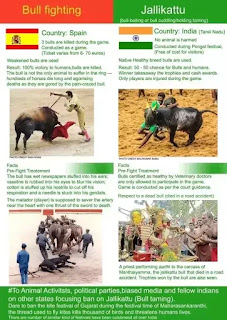 |
| Tamil Nadu, Jallikattu. aimg-a.akamaihd.net |
 |
| Pongal [India Stamp 2006]. iStampGallery.Com |
 |
| Srilanka postal stamp, Pongal. .srilankastamps.lk |
Pongal is an important community celebration in the villages, in particular, of Tamil Nadu State. It marks the sharing of food prepared from the freshly harvested grains, among the rich and poor and also with animals and birds associated with men. This is done in an atmosphere of warmth and friendship among the communities.
 |
| Controversial Jallykattu, TN. /pbs.twimg.com |
 |
| Jallikattu, Tamil nadu. .bbc.co.uk |
 |
| Jallikattu,TN.no body protection. thiru2050.blogspot.com |
In the era of Nayak rulers ( valiant Nayaks were originally military governors under the Vijayanagara Empire; when the empire was defeated by the Deccan sultans in the battle of Talikota - 23 January 1565 several of them in Tamil Nadu declared themselves independent rulers -rajahs) of Thanjavur and Madurai, it was a harmless sport but, now, it has become a poorly organized and dangerous sport. Since the youths engaged in the sports have neither basic training and skill to deal with charging bulls. nor have necessary protection gear against the dangerous bulls. The causality factor is of major concern to the parents and to the government. The trained bulls that run in a frenzy never get hurt, but, on the other hand, youths, hanging on to the horns of the bulls to get the prize money are either thrown away badly or hurt seriously or killed by goring.
The Supreme Court of India banned Jallicattu invoking PCA Act ( saying that bulls cannot be used as performing animals including in bullock cart races; sections 3, 11, and 22). This ban on a traditional sport, part of a particular culture caused widespread protest by the Tamil-speaking people in Tamil Nadu, across India and in many countries. The entire state protested peacefully more or less in a dharmic. The ban was effected temporarily because animal protection organizations made serious protests for many reasons, one being increasing injuries to the participating youths as reported in the media. In the aftermath, this village sport, common in South Tamil Nadu, has become a contentious issue.
The crux of the matter is, it is part of the Pongal festival and has been in practice for centuries. This Param Paraiya sport is pushed to the lowly state because of laxity on the part of organizers who fail to tow certain norms to prevent injury to the participants. However, the court can lift the ban by fixing the age limit for the participants and making it compulsory to follow safety precaution against the dangerous bulls. Further, both the participants and animals need to be tested for drug/liquor abuse, based on which they will be allowed to participate in the sport. Based on an old post:
ttps://en.wikipedia.org/wiki/Mattu_Pongal
Wilson, Horace Hayman; Reinhold Rost (1862). Essays and lectures on the religions of the Hindus, Volume 2. Mattu Pongal. Trüber & Co. pp. 170–173. Retrieved 2009-12-26.
https://www.thehindu.com/news/cities/Madurai/jallikattu-focus-on-safety-measures/article22364549.ece
Wilson, Horace Hayman; Reinhold Rost (1862). Essays and lectures on the religions of the Hindus, Volume 2. Mattu Pongal. Trüber & Co. pp. 170–173. Retrieved 2009-12-26.
https://www.thehindu.com/news/cities/Madurai/jallikattu-focus-on-safety-measures/article22364549.ece












